
Better support people living with anxiety, depression or bipolarity

Provide a turnkey group format that’s quick and easy to set up

Have access to quality tools for your clientele

Learn more about an approach validated by clinical research
our workshops’ structure
![]()
5 topics
in French and in English
![]()
Psycho-educational content :
including exercises, discussions and readings

Groups of 8 to 15 people

Materials designed for facilitators and participants

2 adapted formats, according to your needs : in-person or virtual
**Virtual mode available until March 31, 2026**

Required training for facilitation
Complete, 25- to 30-hour intervention spread over :
• 10 to 12 weeks depending on the topic (and a 1.5-hour pre-workshop session for the virtual workshop, to introduce the participants to the platform)
• 2.5-hour weekly meetings
our turnkey
format
Everything has been designed to make your workshops easy to implement
1. Take the training (minimum of 2 people)
2. Purchase the required materials
3. Promote your workshop
4. Collect registrations
5. Facilitate your workshop
cost breakdown

training
500$ / person

materials
535$ / workshop
virtual
**Virtual mode available until March 31, 2026**
599$ / workshop
in-person
Order the content you need to offer workshops
We offer you :
• 7 hours of self-management training to become an accredited facilitator
• Facilitators’ guides, and workbooks for your participants
• Access to our online platform
• Needs-based support to help make your self-management workshops a success
ready to take
the first step?
training on
self-management
support
To become an accredited facilitator, you must complete a 7-hour training course.
Objectives
- Develop a better understanding of the self-management support approach
- Address key elements of group intervention: empowerment, regaining control, self-efficacy
- Become familiar with the workshops’ content and structure
Prerequisites :
- At least 1 year of experience working with a clientele that has mental health issues
- University degree in helping relationships and/or equivalent (recognized Pairs Aidants Réseau training)
- Sufficient knowledge of anxiety, depression and bipolarity
- The skills required for group intervention and facilitation
- Plan to offer Relief self-management workshops
- Be connected with a recognized partner of our workshops (as staff, volunteer, consultant, or peer supporter)
Upcoming dates
in-person
1 day of 7 hours, in Montreal
Schedule : 9 a.m. to 5 p.m.
Forthcoming dates to be confirmed
(Training held in French)
by videoconference
2 half-days, 3.5 hours each, via Zoom
Schedule: 9 a.m. to 12:30 p.m.
June 3 and 4, 2026
(Trainings held in French)
You did not find what you were looking for? Please let us know your preferences by completing this form.
“The service that partners receive for implementing the workshops is both excellent and personalized. Their approach is truly customer-centred! The workshops’ relevance and effectiveness have been proven. Thank you for this partnership!”
- Norman Gugg, Mental Health and Addiction Programs Branch, CISSS de Lanaudière

discover our 5 workshops
 living with anxiety
living with anxiety
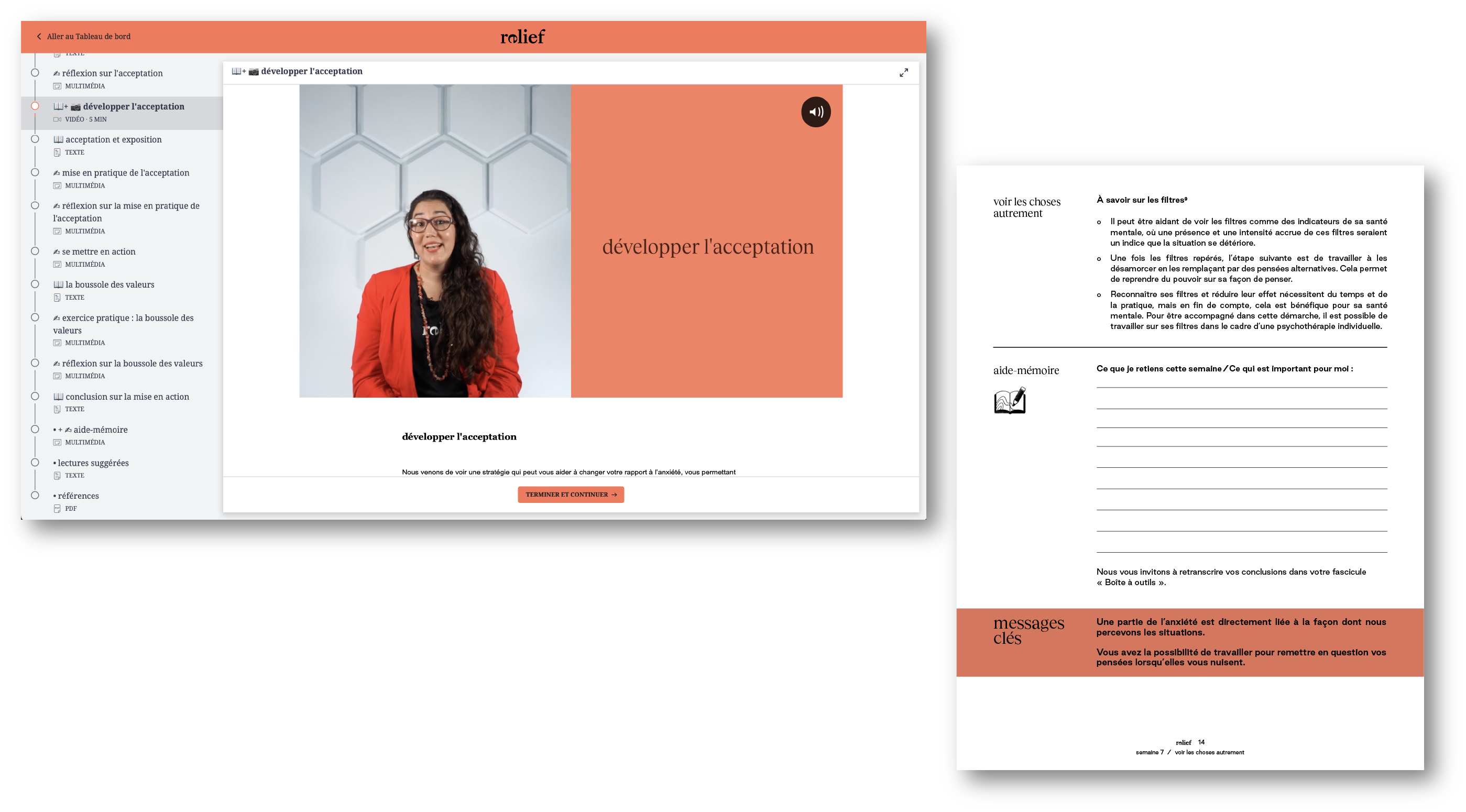
length: 10 weeks (2.5 hours per week)
topics addressed
- Better understanding and observing yourself and your anxiety
- Identifying your anxiety triggers and maintenance factors
- Learning anxiety reduction techniques
- Understanding the role of avoidance and exposure
- Understanding the concept of acceptance and taking action
- Addressing the filters of our perceptions and how they influence anxiety
- Reflecting on the relationships between the self, anxiety and others
- Regaining power over your situation and your anxiety
 living with depression
living with depression
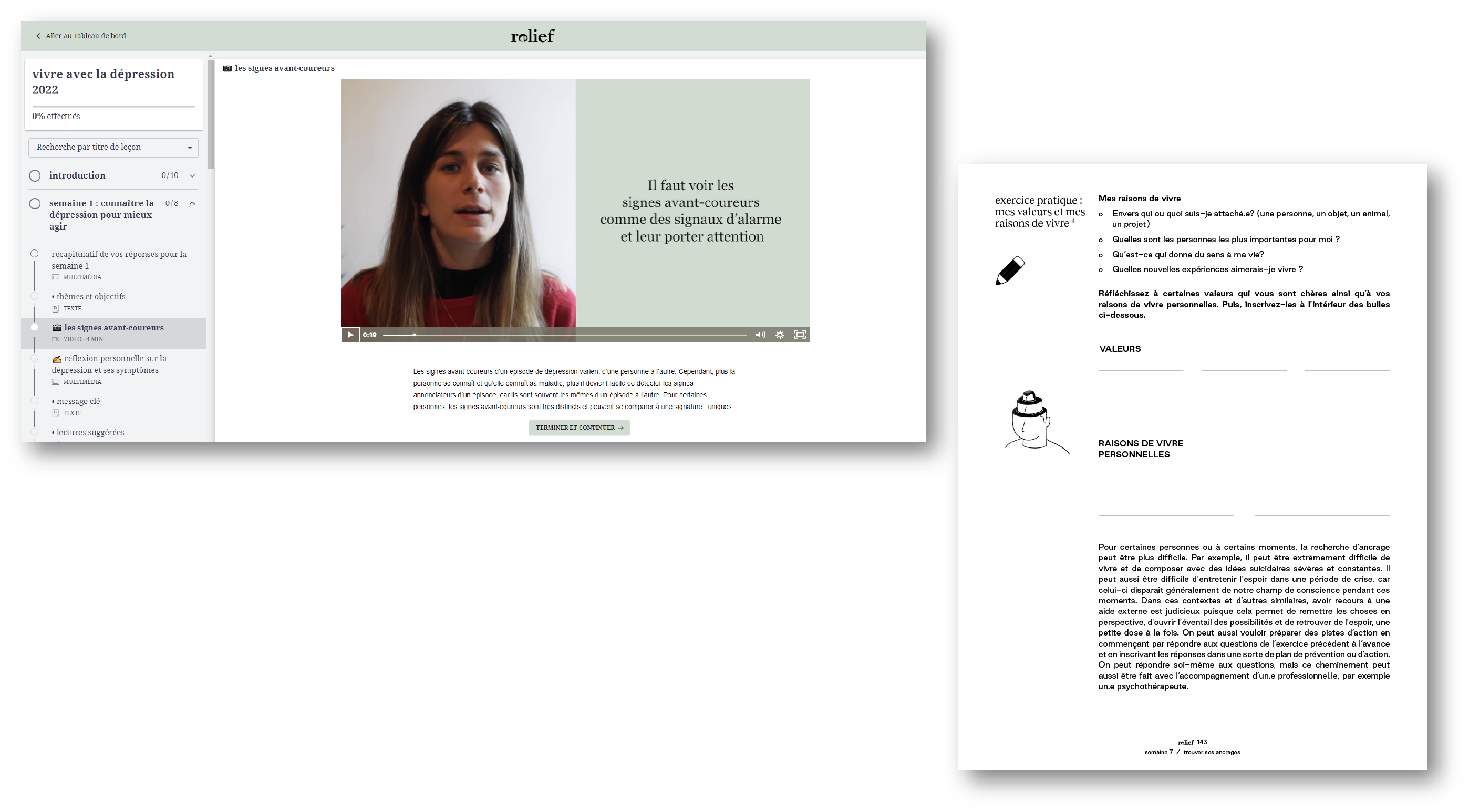
length: 10 weeks (2.5 hours per week)
topics addressed
- Developing a deeper knowledge and observation of yourself, your depression and your warning signs
- Learning more about available resources in order to make better use of them
- Understanding, accepting and influencing your emotions
- Receiving support from others
- Finding your anchors
- Reconsidering your lifestyle habits
- Addressing the filters of perceptions and how they influence mood
- Learning to relieve tension and better manage stress
- Adjusting at work
 living with bipolarity
living with bipolarity
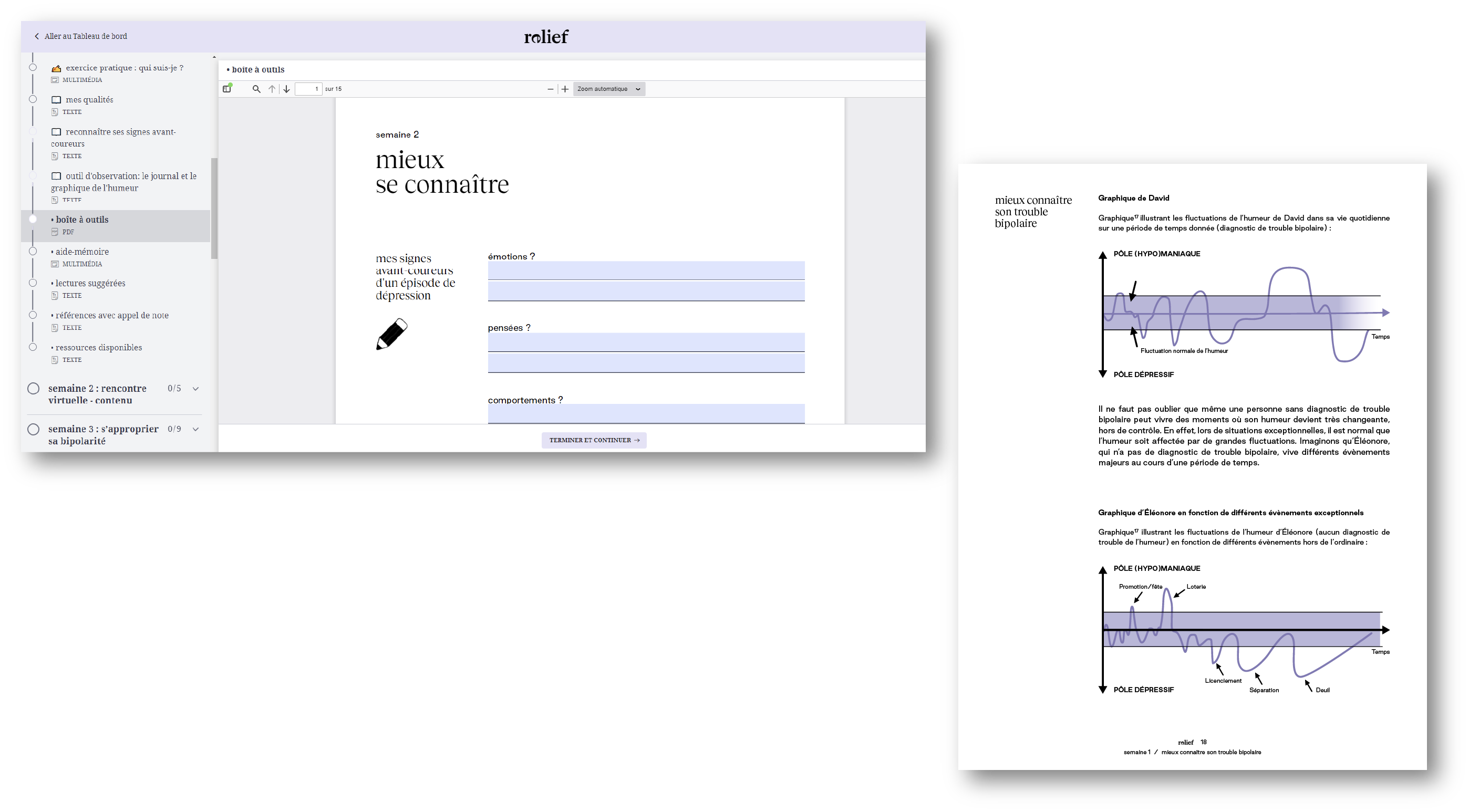
length: 12 weeks (2.5 hours per week)
topics addressed
- Developing a deeper knowledge and observation of yourself, your bipolarity and your warning signs
- Learning more about available resources in order to make better use of them
- Reflecting on your lifestyle habits and how they influence mood
- Better understanding your emotions and finding ways to channel them better
- Fostering healthy interpersonal relationships
- Understanding the importance of and receiving social support
- Drawing up a self-management plan
 living with a better self-esteem
living with a better self-esteem
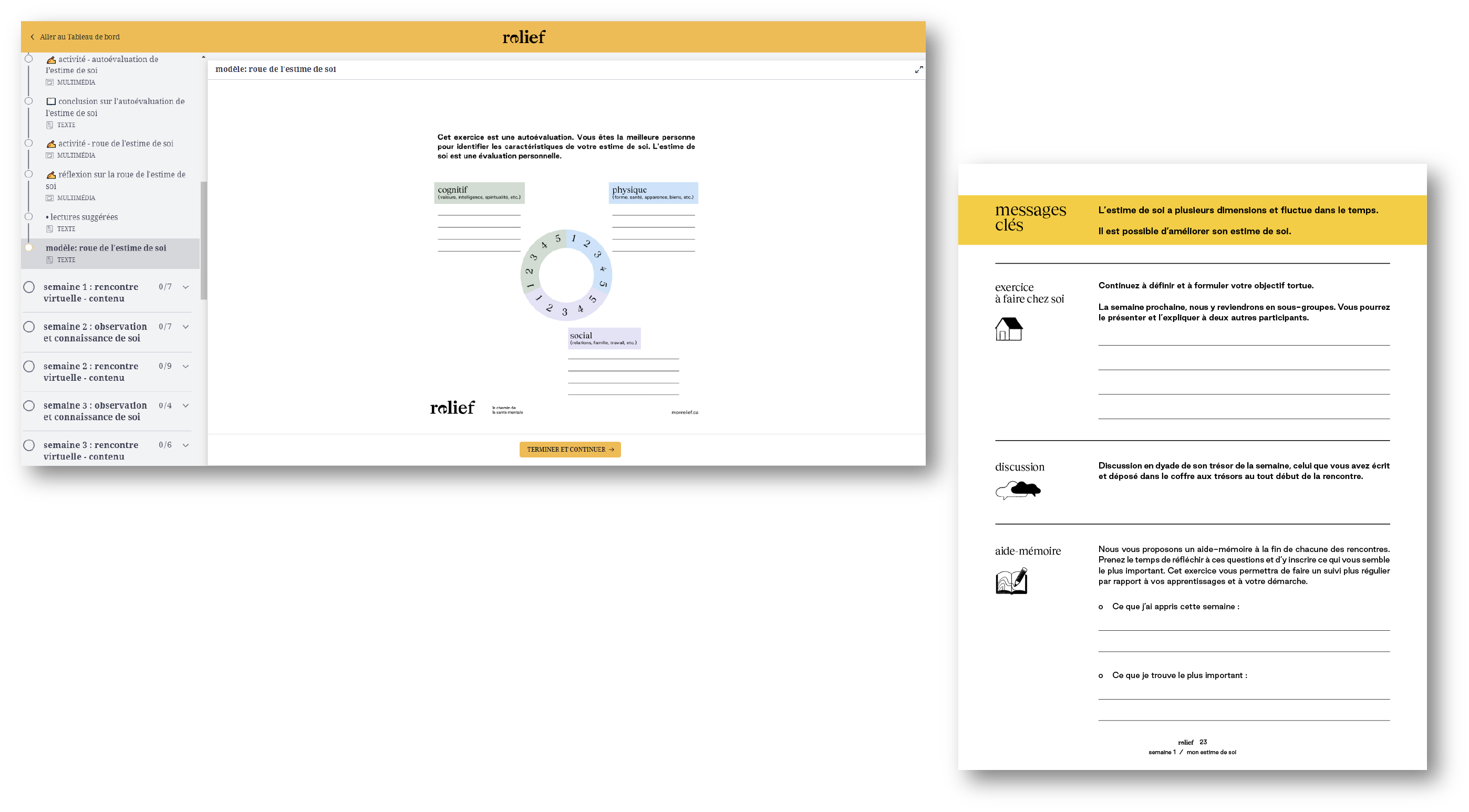
length: 10 weeks (2.5 hours per week)
topics addressed
- Considering self-esteem as multidimensional
- Developing deeper self-knowledge and self-observation
- Focusing on perceptions and how they are shaped by, and in turn influence, self-esteem
- Exploring your emotions, better understanding the role they play, and managing them better
- Considering self-esteem in interpersonal relationships
- Working toward healthier assertiveness
- Determining actions according to your life priorities
 living with a better workplace balance
living with a better workplace balance
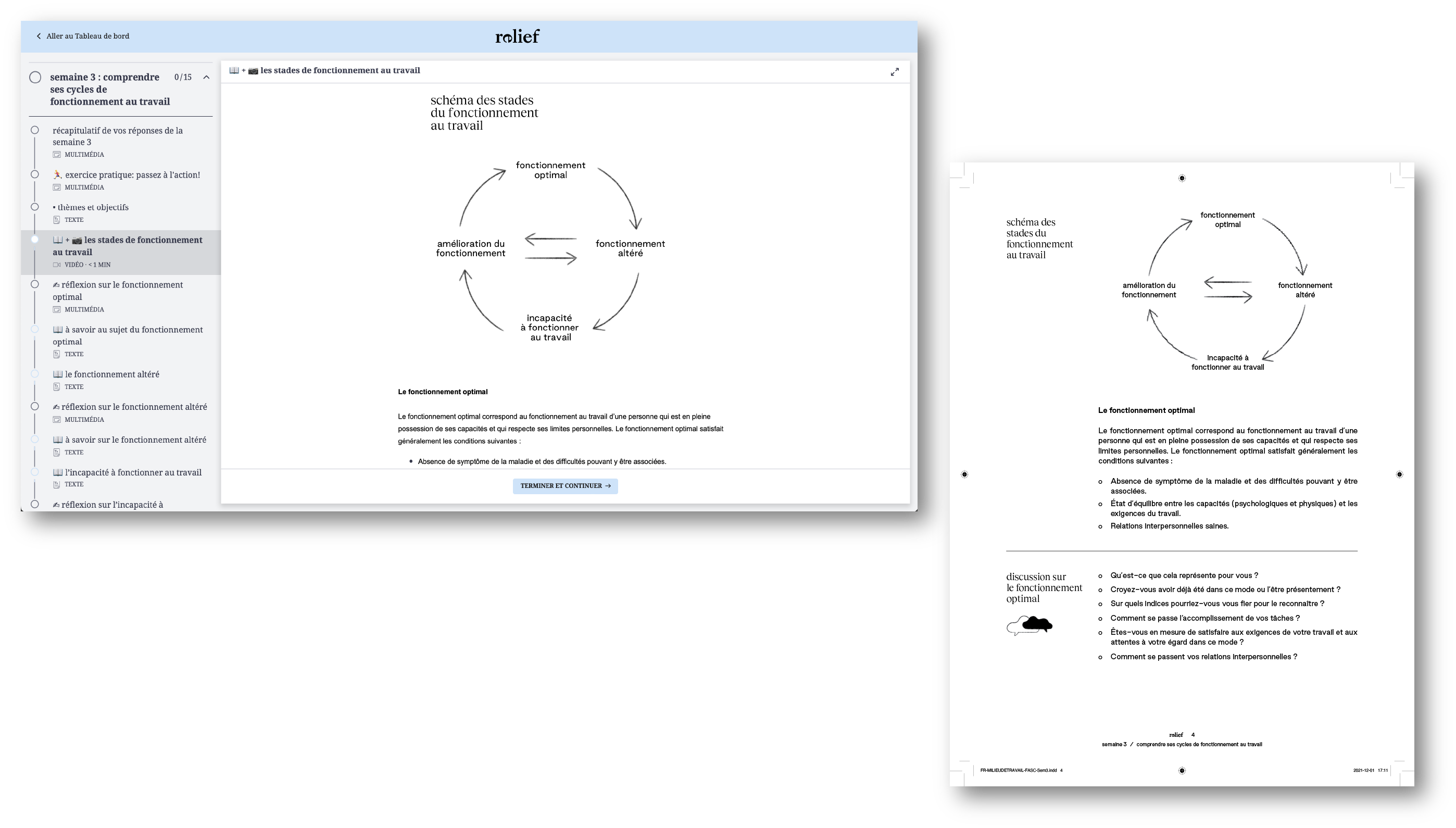
length: 10 weeks (2.5 hours per week)
topics addressed
- Defining what work represents for you and developing a realistic view of it
- Understanding the different manifestations of anxiety, depression or bipolarity in the workplace
- Recognizing your warning signs at work
- Pinpointing your functional cycles
- Recognizing the influence of your perceptions so that you can work on modifying them
- Better managing your stress at work
- Addressing disclosure and accommodation issues
- Better understanding and managing medical leaves of absences and concerns about going back to work
- Facilitating your return to work
our network
of partners
What our partners say:
85%
are satisfied with their experience with Relief93%
would recommend to organizations that they hold self-management workshops85 partners
83 in Quebec,1 in New-Brunswick,
1 in Ontario
85%
would recommend our training201 workshops
offered
by our partners in 2023-202470 cities
across Quebec
“Most of the tools that are offered are simple, concrete and effective. People are able to integrate them into their daily lives gradually, while staying within their own limits. Some of the participants are already able to apply strategies seen in the workshop, in their daily lives, and see a difference in how they respond to anxiety-provoking situations.”
- Elsa Mongeau, counsellor, Sous le toit de l’Échelon, Sainte-Adèle

FAQ
self-management workshops
what is self-management?
Self-management refers to taking action to regain control over our mental health through daily behaviours that diminish symptoms, help prevent relapses and improve well-being. A self-management approach does not replace conventional treatment, but can be a very effective complement to psychotherapy and pharmacotherapy.
what does a self-management workshop actually consist of?
A self-management workshop is a group based psychoeducational intervention. Each workshop is composed of 10 to 15 participants and lasts 10 to 12 weeks, with a 2.5-hour meeting each week. Participants complete exercises and reflections at home, engage in group discussions in the workshop, and have access to resources (organized by topic).
who are the self-management workshops for?
- Anyone 18 years of age or older living with anxiety, depression or bipolarity. No diagnosis is required, except for the Living with Bipolarity workshop.
- The intensity of symptoms can vary widely, from mild to severe.
- To participate, an individual must find that the signs and manifestations of their anxiety, depression or bipolarity sufficiently affect their well-being and functioning to justify spending a total of 25 hours in a group workshop.
how many participants are required in order to hold a self-management workshop?
We recommend starting off a group when there are 8 to 15 participants, in order to be able to reproduce the desired group effect even if a few participants withdraw along the way.
training on self-management support
what does the training consist of?
The training is seven hours long and introduces the concepts and fundamentals of self-management support for mental health. The approach is theoretical and lecture-based, but also includes role-play scenarios drawn from the self-management workshops.
why is training required to be able to facilitate the self-management workshops?
We want to ensure that the workshop is offered as originally designed, regardless of where it is held in Quebec or by which organization. The self-management workshops have undergone rigorous content validation by a committee of experts.
how do I cancel or request a refund for my training participation?
You can cancel free of charge up to 1 week before the training. For shorter notice, credit can be given for future training. If you have any questions, please contact us at [email protected].
workshop co-facilitation
who can facilitate the workshops?
Mental health professionals such as psychologists, social workers, psychoeducators, occupational therapists, nurses, and trained workers can lead our self-management workshops, and co-facilitation by a professional and a certified peer supporter may also be appropriate. Facilitators must have at least one year of experience working with a clientele that has mental health issues; a university degree in helping relationships and/or equivalent (recognized Pairs Aidants Réseau training); sufficient knowledge of anxiety, depression, and bipolarity; the skills required for group intervention and facilitation; a plan to offer Relief self-management workshops; and be connected with a recognized partner of our workshops (as staff, volunteer, consultant, or peer supporter). Please consult the recommended profile for details.
why is co-facilitation required?
Co-facilitation is recommended and is standard practice for most programs involving recurrent mental-health group interventions. Among other things, co-facilitation helps to manage difficult situations within the group.
access to the Relief platform
Does the Relief platform let users schedule video meetings?
The platform does not have an integrated videoconferencing app; it merely hosts the contents of the self-management workshop. The platform replaces printed materials (the facilitator’s guide and workbooks) and provides specific features to enhance online learning for participants, and facilitation for facilitators. Each organization must therefore have an app to be able to hold the virtual meetings. The choice of platform is at the discretion of each organization.
how to get access to the e-learning platform?
If you would like to offer a virtual self-management workshop, please follow the link below and complete the order form to obtain your access to the online learning platform: relief.ca/relief-1/order-form.
can participants print the contents on the platform?
Yes, it is possible to print certain contents or to make text entries (copy-paste) in a document. However, the platform does not provide participants with a printed booklet (the weekly workbook) as in the face-to-face workshops. It is important to understand that the approach is adapted for a virtual format. Note that, once registered, participants have access to their online workshop for 12 months (1 year).
are practitioners trained on how to use the Relief platform?
Yes. An online training tutorial is available in the co-facilitator’s dashboard when they log in to their account. This roughly two-hour tutorial aims to:
1. Present the features of the virtual learning platform;
2. Train facilitators to use the platform in a way that optimizes their (and the participants’) virtual experience;
3. Help develop a virtual-intervention practice.
does the platform include technical support?
Yes. We have a team that can answer any troubleshooting questions from participants or co-facilitators. This is not a 24/7 service, but we are committed to following up in a timely manner. In addition, weekly sessions are held on Zoom to respond to user needs and problems in real time. All of this technical-support information is available on the platform when you access your online account.
find a workshop in your area
Relief offers online and in-person workshops in the Montreal area. But if you wish to participate in an in-person workshop in another region of Quebec, this is also possible thanks to our 60 partners across the province.
facilitate a workshop
Are you from an organization that works with clients living with anxiety, depression or bipolarity? Are you interested in taking self-management support training to be able to facilitate one of our workshops?
offer a workshop
Become a Relief partner and offer our self-management workshops to your clients living with anxiety or mood issues.
